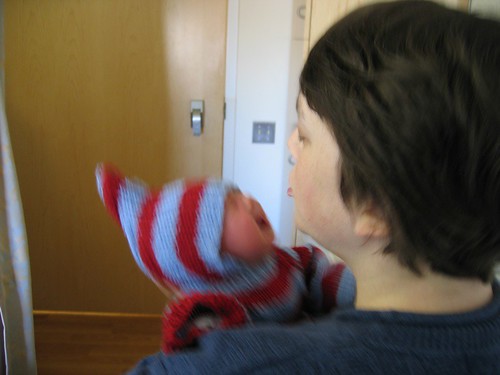One of the reasons Jennifer and I stayed in Providence after I got my MAT at Brown was because of the round of reforms that new superintendent Diana Lam was starting (and no, her subsequent move to New York did not go well...). I took the initiative and joined the redesign team for Feinstein High School, a low-performing small high school, the only person who wasn't already connected to the school to do so, and reaped a bevy of interesting opportunities as a result. I was kind of surprised that more people in the city, which historically has more than its share of driven, innovative high school teachers, didn't join in this opportunity to redesign a progressive school, but the prevailing attitude was "this too shall pass."
And you know what, that sentiment was correct. Ms. Lam is now two superintendents past, and a couple weeks ago, in yet another struggle over whether our site-based school could control its own curriculum design, the new person in charge of high schools said to our principal, "you should have worked this out five years ago." We did, of course. It is just that the entire management of the district has turned over, and we're someone else's loose end they'd rather not be bothered with.
I bring up this back story to illustrate one reason why it is relevant that Dan Meyer's anti-anti-NCLB critique comes from a young teacher, despite his protestation. It is easy to imagine when you enter the profession, that the wave of reform that is taking place at the moment is a bracing slap in the face to a slumbering and complacent profession. But after a few years, you see everything you've signed up for dry up and blow away, or at least fall out of favor, and a new reform wave sweep in.
Now, I'm not as weary as I sound in writing this. Almost all of these movements have at least kernels of goodness within them, and some lead to lasting improvements, although usually only local in scale. But after you've done this a while you certainly stop feeling like Dan when he says, "I’m just so grateful to have any assessment that I can’t endorse an alternative to NCLB when no specific alternative has been formulated," or at least that's the case if you're in Rhode Island. We already have a specific alternative that we still use above and beyond NCLB, which includes a rigorous site visit, ongoing comprehensive surveys of students, faculty, and parents, school improvement plans and testing. Before that the Providence School Department and the union spent years working on another previous set of standards. Feinstein is criticized in its new SALT report for not aligning the curriculum sufficiently with the new curriculm standards, but the reason we haven't is because we spent so much time aligning with the previous set of "New Standards," it gets exhausting to start over for no apparent reason. So excuse me for not thanking the stars for just any evaluation of student progress, no matter how crappy.
Beyond that, his assertion that nobody has proposed specific alternatives to NCLB reminds me way too much of Bush's hollow complaint that nobody is offering their own plans for Iraq. Of course they have; he's just ignored them. There are lots of specific proposals for fine tuning NCLB. I'm afraid NCLB has poisoned the well for federal-scale reform, and the best outcome would be to leave things up to the states. I certainly trust my little state to handle things better than the Feds.
In wrapping up this ramble, I'm not down with the back-slapping commentary:
It’s great to read a passionate discussion on the web that doesn’t degenerate, that keeps its eyes on the prize.
Dan didn't start this discussion out on civil or particularly thoughtful terms ("My union’s monthly propoganda rag, California Educator, is often painful to read, full of conspiracy theorizing, transparent political rabble-rousing, and hoary teaching clichés about “making a difference,” but its September 2006 issue was almost unreadable. Quotes from an article entitled NCLB Gets An F ranged from sensational to sniveling."), and he deserves no credit for not degenerating further.

